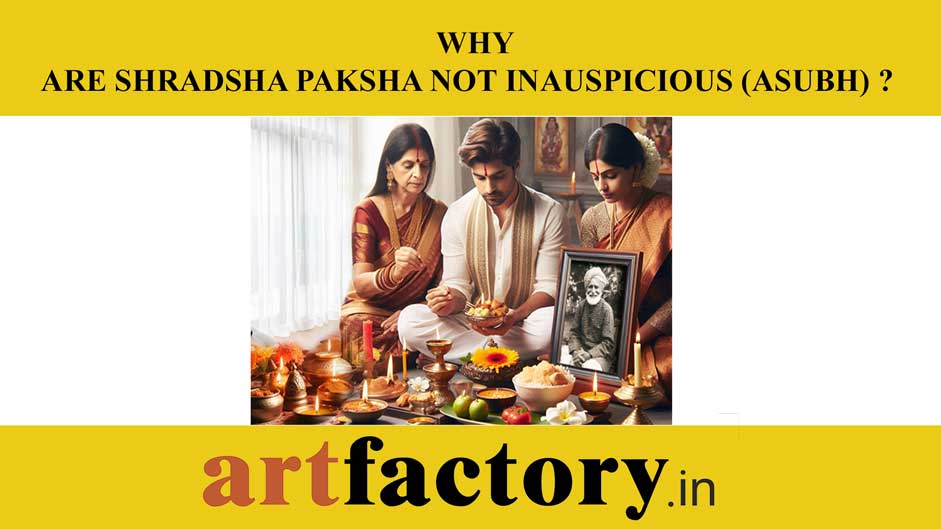
Why are Shradsha Paksha not inauspicious (asubh) ?
Shraddha Paksha (also known as Pitru Paksha) is a period in the Hindu calendar dedicated to honoring and paying respects to one's ancestors. It is traditionally observed over 16 days, typically in the lunar month of Bhadrapada (September-October), starting on the full moon day (Purnima) and ending on the new moon day (Amavasya).
Many people mistakenly believe that Shraddha Paksha is a time of inauspiciousness (asubh days), but this is a misconception. Here's why these days are not considered inauspicious:
Respect for Ancestors: Shraddha Paksha is a sacred period for performing rituals and offering tarpan (water offerings) to ancestors, expressing gratitude and seeking their blessings. It is a time to honor and remember the departed souls in the family, which is considered a highly virtuous and spiritually significant act.
Spiritual Merit (Punya): Performing Shraddha rituals is believed to bring spiritual merit (punya) to the family. It is an act of dharma (duty) that helps ensure the well-being and peace of the ancestors’ souls. This, in turn, brings blessings, prosperity, and peace to the living family members.
Cultural Tradition: In Hindu culture, respect for ancestors and the cycle of life and death is deeply ingrained. Shraddha Paksha is a reflection of the belief in the continuity of life and the bond between the living and the departed. Observing these rituals is a way to maintain this sacred connection, which is far from being considered inauspicious.
Positive Energy: Engaging in rituals, prayers, and offerings during this period is believed to cleanse negative energies and invoke positive energies. It is a time for spiritual purification and reflection, making it a period of positive and constructive energy rather than one of negativity.
Misconception of Inauspiciousness: The misconception that Shraddha Paksha is inauspicious arises mainly from the idea that these days are associated with death and ancestors. However, in Hindu philosophy, death is seen as a natural part of the life cycle and a transition rather than an end. The rituals during Shraddha Paksha are meant to aid this transition and are therefore considered auspicious in their own right.
In summary, Shraddha Paksha is not a period of inauspiciousness but rather a time of deep respect, spiritual duty, and connection with one's ancestors. It is a time to perform rituals that bring peace to the departed and blessings to the living, contributing positively to the spiritual well-being of the family.
Questions & Answers
What is Shraddha Paksha?
- Shraddha Paksha, also known as Pitru Paksha, is a 16-day period in the Hindu calendar dedicated to honoring and offering prayers to one's ancestors.
Why are Shraddha Paksha days considered sacred?
- These days are considered sacred because they involve rituals that pay respect to ancestors, seek their blessings, and ensure their peace, which is believed to bring spiritual merit to the family.
Is Shraddha Paksha considered inauspicious?
- No, Shraddha Paksha is not considered inauspicious. The misconception stems from its association with death, but in reality, it is a period of spiritual reflection and connection with ancestors.
What are the benefits of performing Shraddha rituals?
- Performing Shraddha rituals brings spiritual merit, purifies negative energies, and invokes blessings and prosperity for the family.
Why is there a misconception about Shraddha Paksha being asubh (inauspicious)?
- The misconception arises from the association with death, but Hindu philosophy views it as a natural part of life, making these rituals highly auspicious and beneficial.
What kind of rituals are performed during Shraddha Paksha?
- Common rituals include offering water (tarpan), food (pind daan), and prayers to the departed souls to ensure their peace and contentment in the afterlife.
How does Shraddha Paksha contribute to family well-being?
- By performing these rituals, families ensure the peace of their ancestors, which is believed to bring blessings, prosperity, and harmony to the living members.
What is the significance of Shraddha Paksha in Hindu culture?
- It symbolizes the eternal bond between the living and the departed, emphasizing the importance of respecting and remembering ancestors as a key aspect of Hindu tradition.
Can Shraddha Paksha rituals be performed at home?
- Yes, Shraddha rituals can be performed at home or in a temple, often with the guidance of a priest to ensure they are done correctly and respectfully.
What is the spiritual meaning of Shraddha Paksha?
- Spiritually, Shraddha Paksha is about honoring the cycle of life and death, ensuring the well-being of ancestors, and maintaining harmony within the family through their blessings.
For more details,visit:https://www.artfactory.in/

Comments : (0)